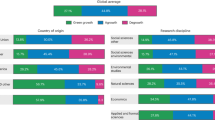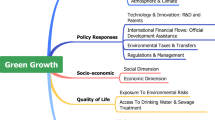Abstract
Degrowth is a sustainability strategy that is attracting increasing scientific interest, but is seen as too radical for politicians to accept, especially when compared with ‘green growth’. Here we use Q methodology to investigate viewpoints of political elites on degrowth and green growth by inquiring the views of 41 elected members of the European Parliament. We find opinions clustered around three distinct discourses: a ‘Post-growth Deal’, closer to degrowth, an ‘Ecosocialist Green New Deal’ and finally a ‘Liberal Green Deal’, linked to green growth. Green growth opinions are found in the centre-right of the political spectrum while two distinct centre-left/left discourses (post-growth and eco-socialism) are respectively critical and agnostic towards growth and coalesce on public investment, environmental justice, and working-hours reduction. Radical sustainability opinions therefore exist among elected policy makers, and consensus does not necessarily build on supposedly win–win options that combine growth and sustainability. Questions remain over when and how such radical opinions may find expression in concrete policies.
This is a preview of subscription content, access via your institution
Access options
Access Nature and 54 other Nature Portfolio journals
Get Nature+, our best-value online-access subscription
$29.99 / 30 days
cancel any time
Subscribe to this journal
Receive 12 digital issues and online access to articles
$119.00 per year
only $9.92 per issue
Buy this article
- Purchase on Springer Link
- Instant access to full article PDF
Prices may be subject to local taxes which are calculated during checkout



Similar content being viewed by others
Data availability
The data that support the findings of this study are available in the publicly accessible repository Zenodo.
Code availability
All the data used to produce the results of the study are available through Zenodo (https://doi.org/10.5281/zenodo.8332338).
References
Hickel, J. et al. Degrowth can work—here’s how science can help. Nature 612, 400–403 (2022).
Van den Bergh, J. C. & Kallis, G. Growth, a-growth or degrowth to stay within planetary boundaries? J. Econ. Issues 46, 909–920 (2012).
Van Den Bergh, J. C. A third option for climate policy within potential limits to growth. Nat. Clim. Change 7, 107–112 (2017).
Jakob, M. & Edenhofer, O. Green growth, degrowth, and the commons. Oxf. Rev. Econ. Policy 30, 447–468 (2014).
Likaj, X, Jacobs, M. & Fricke, T. Growth, degrowth or post-growth? Towards a synthetic understanding of the growth debate. Forum New Economy https://ideas.repec.org/p/agz/bpaper/2202.html (2022).
Fiorino, D. J. A Good Life on a Finite Earth: The Political Economy of Green Growth (Oxford Univ. Press, 2018).
Jackson, T. & Victor, P. A. Unraveling the claims for (and against) green growth. Science 366, 950–951 (2019).
Hickel, J. & Kallis, G. Is green growth possible? N. Polit. Econ. 25, 469–486 (2020).
Ekins, P., Drummond, P., Scamman, D., Paroussos, L. & Keppo, I. The 1.5 °C climate and energy scenarios: impacts on economic growth. Oxf. Open Energy 1, oiac005 (2022).
Keyßer, L. T. & Lenzen, M. 1.5 °C degrowth scenarios suggest the need for new mitigation pathways. Nat. Commun. 12, 2676 (2021).
D’Alessandro, S., Cieplinski, A., Distefano, T. & Dittmer, K. Feasible alternatives to green growth. Nat. Sustain. 3, 329–335 (2020).
Stoknes, P. E. & Rockström, J. Redefining green growth within planetary boundaries. Energy Res. Soc. Sci. 44, 41–49 (2018).
Tilsted, J. P., Bjørn, A., Majeau-Bettez, G. & Lund, J. F. Accounting matters: revisiting claims of decoupling and genuine green growth in Nordic countries. Ecol. Econ. 187, 107101 (2021).
Milanović, B. The illusion of ‘degrowth’ in a poor and unequal world. globalinequality. Blogger http://glineq.blogspot.com/2017/11/the-illusion-of-degrowth-in-poor-and.html (2017).
Van den Bergh, J. C. Environment versus growth—a criticism of ‘degrowth’ and a plea for ‘a-growth’. Ecol. Econ. 15, 881–890 (2011).
Buch-Hansen, H. & Carstensen, M. B. Paradigms and the political economy of ecopolitical projects: green growth and degrowth compared. Compet. Change 25, 308–327 (2021).
Hallegatte, S. Can we live within environmental limits and still reduce poverty? Degrowth or decoupling? Dev. Policy Rev. 40, e12584 (2022).
Terzi, A. Growth for Good: Reshaping Capitalism to Save Humanity from Climate Catastrophe (Harvard Univ. Press, 2022).
Drews, S., Savin, I. & van den Bergh, J. C. Opinion clusters in academic and public debates on growth-vs-environment. Ecol. Econ. 157, 141–155 (2019).
Paulson, L. & Büchs, M. Public acceptance of post-growth: factors and implications for post-growth strategy. Futures 143, 103020 (2022).
Rivera, M. Growth in parliament: some notes on the persistence of a dogma. Futures 95, 1–10 (2018).
Drews, S. & van den Bergh, J. Public views on economic growth, the environment and prosperity: results of a questionnaire survey. Glob. Environ. Change 39, 1–14 (2016).
Ladrech, R. & Little, C. Drivers of political parties’ climate policy preferences: lessons from Denmark and Ireland. Environ. Polit. 28, 1017–1038 (2019).
Inglehart, R. in Electoral Change in Advanced Industrial Democracies. Realignment or Dealignment? (eds Dalton, R. J., Flanagan, S. & Beck, P. A.) 25–69 (Princeton Univ. Press, 1984).
Båtstrand, S. Giving content to new politics. From broad hypothesis to empirical analysis using Norwegian manifesto data on climate change. Part. Polit. 20, 930–939 (2014).
Muller-Rommel, F. New Politics in Western Europe: The Rise and Success of Green Parties and Alternative Lists (Routledge, 2019).
Spoon, J. J. Holding their own: explaining the persistence of Green parties in France and the UK. Part. Polit. 15, 615–634 (2009).
Carter, N. Greening the mainstream: party politics and the environment. Environ. Polit. 22, 73–94 (2013).
Forchtner, B. Climate change and the far right. WIREs Clim. Change 10, e604 (2019).
Lockwood, M. Right-wing populism and the climate change agenda: exploring the linkages. Environ. Polit. 27, 712–732 (2018).
Schaller, S. & Carius, A. Convenient truths. Mapping climate agendas of right-wing populist parties in Europe. adelphi https://www.adelphi.de/en/publication/convenient-truths (2019).
Carter, N. & Little, C. Party competition on climate policy: the roles of interest groups, ideology and challenger parties in the UK and Ireland. Int. Polit. Sci. Rev. 42, 16–32 (2021).
Vihma, A., Reischl, G. & Nonbo Andersen, A. A climate backlash: comparing populist parties’ climate policies in Denmark, Finland, and Sweden. J. Environ. Dev. 30, 219–239 (2021).
Green‐Pedersen, C. & Wolfe, M. The institutionalization of environmental attention in the United States and Denmark: multiple‐versus single‐venue systems. Governance 22, 625–646 (2009).
Carter, N. & Clements, B. From ‘greenest government ever’ to ‘get rid of all the green crap’: David Cameron, the Conservatives and the environment. Br. Polit. 10, 204–225 (2015).
Båtstrand, S. More than markets: a comparative study of nine conservative parties on climate change. Polit. Policy 43, 538–561 (2015).
Buzogány, A. & Ćetković, S. Fractionalized but ambitious? Voting on energy and climate policy in the European Parliament. J. Eur. Public Policy 28, 1038–1056 (2021).
Carter, N. & Jacobs, M. Explaining radical policy change: the case of climate change and energy policy under the British Labour Government 2006–10. Public Adm. 92, 125–141 (2014).
Schulze, K. Policy characteristics, electoral cycles, and the partisan politics of climate change. Glob. Environ. Polit. 21, 44–72 (2021).
Hess, D. J. & Renner, M. Conservative political parties and energy transitions in Europe: opposition to climate mitigation policies. Renew. Sustain. Energy Rev. 104, 419–428 (2019).
Hajer, M. A. The Politics of Environmental Discourse: Ecological Modernization and the Policy Process (Oxford Univ. Press, 1997).
Robbins, P. The politics of barstool biology: environmental knowledge and power in greater Northern Yellowstone. Geoforum 37, 185–199 (2006).
Brown, S. R. Political Subjectivity: Applications of Q Methodology in Political Science (Yale Univ. Press, 1980).
The European Green Deal: Communication from the Commission to the European Parliament, the European Council, the Council, the European Economic and Social Committee and the Committee of the Regions (COM(2019)640 final) (European Commission, 2019).
Thomas, D. B. & Baas, L. R. The issue of generalization in Q methodology: ‘reliable schematics’ revisited. Operant Subjectivity 16, 18–36 (1992).
Wahlsten, J. To Assemble Society Anew? The Political Economy of Contemporary Initiatives of Socio-Ecological Transformation. Helsinki Centre for Global Political Economy Working Paper, 02/2020 (Univ. Helsinki, 2020).
Adler, D. & Wargan, P. Europe can’t decarbonize without democracy. Jacobin https://jacobinmag.com/2020/03/decarbonize-democracy-european-union-green–new-deal (2020).
Jackson, T. The post-growth challenge: secular stagnation, inequality and the limits to growth. Ecol. Econ. 156, 236–246 (2019).
Gómez-Baggethun, E. & Naredo, J. M. In search of lost time: the rise and fall of limits to growth in international sustainability policy. Sustain. Sci. 10, 385–395 (2015).
Samper, J. A., Schockling, A. & Islar, M. Climate politics in green deals: exposing the political frontiers of the European Green Deal. Polit. Gov. 9, 8–16 (2021).
Barry, J. & Proops, J. Seeking sustainability discourses with Q methodology. Ecol. Econ. 28, 337–345 (1999).
McKeown, B. & Thomas, D. Q Methodology (SAGE Publications, 2013).
Mastini, R., Kallis, G. & Hickel, J. A Green New Deal without growth? Ecol. Econ. 179, 106832 (2021).
Jenkins, M. W. Exploring the Effects of Heat and Drought on Conifer Trees: From Semi-arid Woodlands to Coast Redwoods (Univ. California, Santa Cruz, 2016).
McKeown, M., Hinks, M., Stowell‐Smith, M., Mercer, D. & Forster, J. Q methodology, risk training and quality management. Int. J. Health Care Qual. Assur. Inc. Leadersh. Health Serv. 12, 254–266 (1999).
Watts, S. & Stenner, P. Doing Q methodology: theory, method and interpretation. Qual. Res. Psychol. 2, 67–91 (2005).
Acknowledgements
We acknowledge support by the ‘María de Maeztu’ Unit of Excellence (MDM-2015-0552) grant. G.K.: this work was supported by the European Research Council REAL—ERC-2022-SYG REAL reference number 101071647. R.M.: the PhD project that gave rise to the results of this study received the support of a fellowship from ‘la Caixa’ Foundation (ID100010434) with code LCF/BQ/IN18/11660059. C.Z.: acknowledges support by the GRES research project (contract number CNS2022-136115) funded by the Spanish Ministry of Science and Innovation MCIN/AEI/10.13039/501100011033 and the European Union Next Generation/PRTR programme. We acknowledge R. Sorensen for her help with editing and E. Karafilli for her help with the visuals.
Author information
Authors and Affiliations
Contributions
Conceptualization: G.K., R.M. and C.Z. Methodology: G.K., R.M. and C.Z. Data collection: R.M. Data analysis: R.M. and C.Z. Visualization: G.K., R.M. and C.Z. Writing: G.K., R.M. and C.Z. Funding acquisition: R.M.
Corresponding author
Ethics declarations
Competing interests
The authors declare no competing interests.
Peer review
Peer review information
Nature Sustainability thanks Aron Buzogány, Vasiliki Tsagkroni and the other, anonymous, reviewer(s) for their contribution to the peer review of this work.
Additional information
Publisher’s note Springer Nature remains neutral with regard to jurisdictional claims in published maps and institutional affiliations.
Supplementary information
Rights and permissions
Springer Nature or its licensor (e.g. a society or other partner) holds exclusive rights to this article under a publishing agreement with the author(s) or other rightsholder(s); author self-archiving of the accepted manuscript version of this article is solely governed by the terms of such publishing agreement and applicable law.
About this article
Cite this article
Kallis, G., Mastini, R. & Zografos, C. Perceptions of degrowth in the European Parliament. Nat Sustain 7, 64–72 (2024). https://doi.org/10.1038/s41893-023-01246-x
Received:
Accepted:
Published:
Issue Date:
DOI: https://doi.org/10.1038/s41893-023-01246-x



